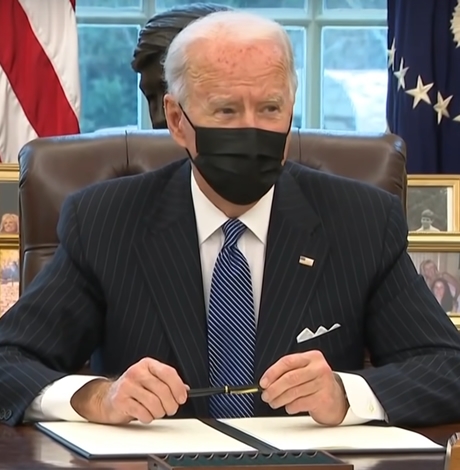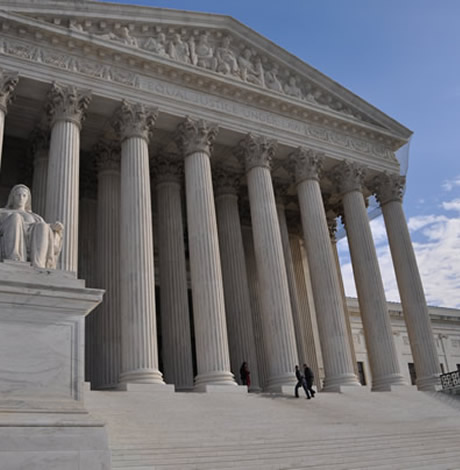National
Exxon Mobil rejects resolution to protect LGBT workers
Only 20 percent of shareholders vote ‘yes’ on non-discrimination policy

Exxon Mobil rejected an LGBT non-discrimination policy for the 16th time (Photo of Exxon sign by Ildar Sagdejev, photo of Mobil sign by Terence Ong; courtesy Wikimedia Commons)
Exxon Mobil shareholders voted by a significant margin on Wednesday to reject a resolution that would have expanded the company’s equal employment opportunity policy to include non-discrimination protections for LGBT workers.
This year is the 16th time the company rejected a resolution to protect LGBT workers, according to Exxon Mobil, despite some media reports that it was the 14th time.
This year, this resolution was sponsored New York State Comptroller Thomas DiNapoli, whose state owns a significant share in the company. The resolution failed after only 19.8 percent of shareholders approved the measure.
Tico Almeida, president of the LGBT group Freedom to Work, chided Exxon Mobil for not instituting a policy that would bring the company into alignment with its competitors and other Fortune 500 companies, such as BP and Texaco.
“Exxon shareholders once again rejected a measure that would simply provide all Americans a fair shot to hold a job no matter who they are or who they love,” Almeida said. “Every day, more and more Americans realize that the Golden Rule of treating others as we would like to be treated applies to gay and transgender people too. Exxon remains on the wrong side of history for its business, for its workers and for the American people.”
An Exxon Mobil spokesperson wouldn’t comment on the rejection of the resolution other than to provide the vote tallies from this year and the previous two years. In 2012, 20.6 percent of company shareholders voted in favor of the resolution, while in 2011, 19.9 percent of shareholders voted in favor of it.
Tony Perkins, president of the anti-gay Family Research Council, claimed victory over the rejection of the resolution, which said indicates the company “is putting its stock in something other than political correctness.”
“The four to one margin against the resolution is a strong indication that the homosexual community’s agenda is not resonating beyond the most liberal states,” Perkins said. “Exxon is setting a good example for other businesses who think promoting extreme political views is the only away to avoid the strong arm tactics of far left special interests.”
Last week, Freedom to Work filed a lawsuit against Exxon Mobil alleging anti-gay bias in hiring practices in Illinois, which is against state law there. As a part of a potential settlement agreement, Freedom to Work is asking the company to institute a non-discrimination policy for LGBT workers, an option Almeida said is still on the table.
“The directors can agree to a settlement without the shareholders taking up a vote, so we maintain our position that we would settle the lawsuit tomorrow if they would cut and paste the LGBT workplace policies of Chevron or BP or Texaco,” Almeida said. “But they may, out of stubbornness, choose not to settle. They may choose to drag this out as long as possible. In which case, we look forward to the discovery process, litigation where we will subpoena internal documents and depose H.R. professionals to try to root out the cause of Exxon’s stubborn decision to hold on antiquated anti-gay policies.”
The decision to reject the policy at Exxon Mobil — which has received more than $1 billion in U.S. government awards in the past decade — raises the question of whether President Obama will issue an executive order requiring federal contractors to have non-discrimination policies based on sexual orientation and gender identity.
The White House has said it prefers a legislative approach to addressing the issue of LGBT workplace discrimination in the form of the Employment Non-Discrimination Act. In response to a Washington Blade inquiry on whether the Exxon Mobil vote warrants a reexamination of the executive order, Shin Inouye, a White House spokesperson, replied, “Regarding a hypothetical Executive Order on LGBT non-discrimination for federal contractors, I have no updates for you on that issue.”
Nonetheless, Almeida said the vote demonstrates the need for President Obama to take administrative action to protect LGBT workers from discrimination.
“Now is the time for President Obama to act decisively and make clear that doing business with the American government and the American taxpayer means adhering to the American people’s sense of fairness,” Almeida said. “President Obama can and should sign an executive order today that bars federal contracts for companies that don’t prohibit discrimination against LGBT Americans. He made this a written campaign promise five years ago, and there are no good excuses for delaying fairness any longer.”
Federal Government
Lambda Legal praises Biden-Harris administration’s finalized Title IX regulations
New rules to take effect Aug. 1

The Biden-Harris administration’s revised Title IX policy “protects LGBTQ+ students from discrimination and other abuse,” Lambda Legal said in a statement praising the U.S. Department of Education’s issuance of the final rule on Friday.
Slated to take effect on Aug. 1, the new regulations constitute an expansion of the 1972 Title IX civil rights law, which prohibits sex-based discrimination in education programs that receive federal funding.
Pursuant to the U.S. Supreme Court’s ruling in the landmark 2020 Bostock v. Clayton County case, the department’s revised policy clarifies that discrimination on the basis of sexual orientation and gender identity constitutes sex-based discrimination as defined under the law.
“These regulations make it crystal clear that everyone can access schools that are safe, welcoming and that respect their rights,” Education Secretary Miguel Cardona said during a call with reporters on Thursday.
While the new rule does not provide guidance on whether schools must allow transgender students to play on sports teams corresponding with their gender identity to comply with Title IX, the question is addressed in a separate rule proposed by the agency in April.
The administration’s new policy also reverses some Trump-era Title IX rules governing how schools must respond to reports of sexual harassment and sexual assault, which were widely seen as imbalanced in favor of the accused.
Jennifer Klein, the director of the White House Gender Policy Council, said during Thursday’s call that the department sought to strike a balance with respect to these issues, “reaffirming our longstanding commitment to fundamental fairness.”
“We applaud the Biden administration’s action to rescind the legally unsound, cruel, and dangerous sexual harassment and assault rule of the previous administration,” Lambda Legal Nonbinary and Transgender Rights Project Director Sasha Buchert said in the group’s statement on Friday.
“Today’s rule instead appropriately underscores that Title IX’s civil rights protections clearly cover LGBTQ+ students, as well as survivors and pregnant and parenting students across race and gender identity,” she said. “Schools must be places where students can learn and thrive free of harassment, discrimination, and other abuse.”
Michigan
Mich. Democrats spar over LGBTQ-inclusive hate crimes law
Lawmakers disagree on just what kind of statute to pass

Michigan could soon become the latest state to pass an LGBTQ-inclusive hate crime law, but the state’s Democratic lawmakers disagree on just what kind of law they should pass.
Currently, Michigan’s Ethnic Intimidation Act only offers limited protections to victims of crime motivated by their “race, color, religion, gender, or national origin.” Bills proposed by Democratic lawmakers expand the list to include “actual or perceived race, color, religion, gender, sexual orientation, gender identity or expression, ethnicity, physical or mental disability, age, national origin, or association or affiliation with any such individuals.”
Democratic Gov. Gretchen Whitmer and Attorney General Dana Nessel have both advocated for a hate crime law, but house and senate Democrats have each passed different hate crimes packages, and Nessel has blasted both as being too weak.
Under the house proposal that passed last year (House Bill 4474), a first offense would be punishable with a $2,000 fine, up to two years in prison, or both. Penalties double for a second offense, and if a gun or other dangerous weapons is involved, the maximum penalty is six years in prison and a fine of $7,500.
But that proposal stalled when it reached the senate, after far-right news outlets and Fox News reported misinformation that the bill only protected LGBTQ people and would make misgendering a trans person a crime. State Rep. Noah Arbit, the bill’s sponsor, was also made the subject of a recall effort, which ultimately failed.
Arbit submitted a new version of the bill (House Bill 5288) that added sections clarifying that misgendering a person, “intentionally or unintentionally” is not a hate crime, although the latest version (House Bill 5400) of the bill omits this language.
That bill has since stalled in a house committee, in part because the Democrats lost their house majority last November, when two Democratic representatives resigned after being elected mayors. The Democrats regained their house majority last night by winning two special elections.
Meanwhile, the senate passed a different package of hate crime bills sponsored by state Sen. Sylvia Santana (Senate Bill 600) in March that includes much lighter sentences, as well as a clause ensuring that misgendering a person is not a hate crime.
Under the senate bill, if the first offense is only a threat, it would be a misdemeanor punishable by one year in prison and up to $1,000 fine. A subsequent offense or first violent hate crime, including stalking, would be a felony that attracts double the punishment.
Multiple calls and emails from the Washington Blade to both Arbit and Santana requesting comment on the bills for this story went unanswered.
The attorney general’s office sent a statement to the Blade supporting stronger hate crime legislation.
“As a career prosecutor, [Nessel] has seen firsthand how the state’s weak Ethnic Intimidation Act (not updated since the late 1980’s) does not allow for meaningful law enforcement and court intervention before threats become violent and deadly, nor does it consider significant bases for bias. It is our hope that the legislature will pass robust, much-needed updates to this statute,” the statement says.
But Nessel, who has herself been the victim of racially motivated threats, has also blasted all of the bills presented by Democrats as not going far enough.
“Two years is nothing … Why not just give them a parking ticket?” Nessel told Bridge Michigan.
Nessel blames a bizarre alliance far-right and far-left forces that have doomed tougher laws.
“You have this confluence of forces on the far right … this insistence that the First Amendment protects this language, or that the Second Amendment protects the ability to possess firearms under almost any and all circumstances,” Nessel said. “But then you also have the far left that argues basically no one should go to jail or prison for any offense ever.”
The legislature did manage to pass an “institutional desecration” law last year that penalizes hate-motivated vandalism to churches, schools, museums, and community centers, and is LGBTQ-inclusive.
According to data from the U.S. Department of Justice, reported hate crime incidents have been skyrocketing, with attacks motivated by sexual orientation surging by 70 percent from 2020 to 2022, the last year for which data is available.
Twenty-two states, D.C., Puerto Rico, and the U.S. Virgin Islands have passed LGBTQ-inclusive hate crime laws. Another 11 states have hate crime laws that include protections for “sexual orientation” but not “gender identity.”
Michigan Democrats have advanced several key LGBTQ rights priorities since they took unified control of the legislature in 2023. A long-stalled comprehensive anti-discrimination law was passed last year, as did a conversion therapy ban. Last month the legislature updated family law to make surrogacy easier for all couples, including same-sex couples.
A bill to ban the “gay panic” defense has passed the state house and was due for a Senate committee hearing on Wednesday.
Indiana
Drag queen announces run for mayor of Ind. city
Branden Blaettne seeking Fort Wayne’s top office

In a Facebook post Tuesday, a local drag personality announced he was running for the office of mayor once held by the late Fort Wayne Mayor Tom Henry, who died last month just a few months into his fifth term.
Henry was recently diagnosed with late-stage stomach cancer and experienced an emergency that landed him in hospice care. He died shortly after.
WPTA, a local television station, reported that Fort Wayne resident Branden Blaettne, whose drag name is Della Licious, confirmed he filed paperwork to be one of the candidates seeking to finish out the fifth term of the late mayor.
Blaettner, who is a community organizer, told WPTA he doesn’t want to “get Fort Wayne back on track,” but rather keep the momentum started by Henry going while giving a platform to the disenfranchised groups in the community. Blaettner said he doesn’t think his local fame as a drag queen will hold him back.
“It’s easy to have a platform when you wear platform heels,” Blaettner told WPTA. “The status quo has left a lot of people out in the cold — both figuratively and literally,” Blaettner added.

The Indiana Capital Chronicle reported that state Rep. Phil GiaQuinta, who has led the Indiana House Democratic caucus since 2018, has added his name to a growing list of Fort Wayne politicos who want to be the city’s next mayor. A caucus of precinct committee persons will choose the new mayor.
According to the Fort Wayne Journal Gazette, the deadline for residents to file candidacy was 10:30 a.m. on Wednesday. A town hall with the candidates is scheduled for 6 p.m. on Thursday at Franklin School Park. The caucus is set for 10:30 a.m. on April 20 at the Lincoln Financial Event Center at Parkview Field.
At least six candidates so far have announced they will run in the caucus. They include Branden Blaettne, GiaQuinta, City Councilwoman Michelle Chambers, City Councilwoman Sharon Tucker, former city- and county-council candidate Palermo Galindo, and 2023 Democratic primary mayoral candidate Jorge Fernandez.
-

 Africa5 days ago
Africa5 days agoCongolese lawmaker introduces anti-homosexuality bill
-

 District of Columbia1 day ago
District of Columbia1 day agoReenactment of first gay rights picket at White House draws interest of tourists
-

 World5 days ago
World5 days agoOut in the World: LGBTQ news from Europe and Asia
-

 Arizona2 days ago
Arizona2 days agoAriz. governor vetoes anti-transgender, Ten Commandments bill









